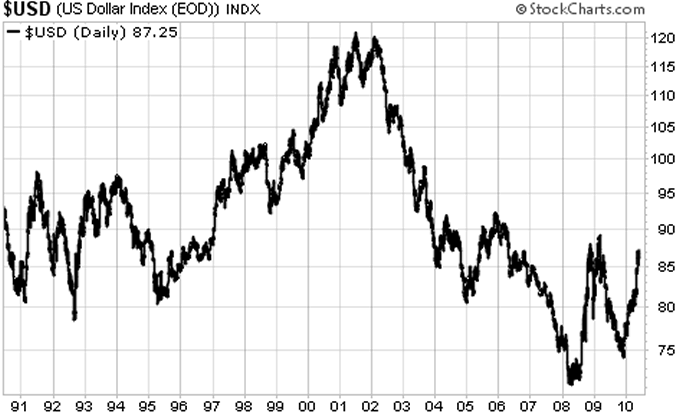Why a Rising U.S. Dollar Is Horrible News for China
Currencies / US Dollar Jun 07, 2010 - 11:18 AM GMTBy: DailyWealth
 Tom Dyson writes: Hugh Hendry is the famous British hedge-fund manager who predicted the banking crisis and made 40% in 2008. Every few months, Hendry writes a letter to his investors, called the Eclectica Monthly Letter. It's among the best financial commentary you'll find anywhere on the Internet.
Tom Dyson writes: Hugh Hendry is the famous British hedge-fund manager who predicted the banking crisis and made 40% in 2008. Every few months, Hendry writes a letter to his investors, called the Eclectica Monthly Letter. It's among the best financial commentary you'll find anywhere on the Internet.
In his most recent commentary, Hendry implies you better watch this chart...
It shows the U.S. dollar index over the last 20 years. The U.S. dollar index measures the dollar's value against a basket of international currencies. First, notice the decade-long bear market ending in 2008. The dollar lost 41% of its value against foreign currencies in this time. Now, look at the recent price action. The dollar tested its low in 2009. Now, it's rising...

Here's the thing that makes this chart so important...
Hendry says if the dollar continues rising, you're eventually going to see a depression in China and possibly the rest of Asia. Commodities will also collapse... especially the commodities China buys in big volume, like cement, steel, aluminum, copper, and iron ore.
It's because of exchange rates. You see, China has pegged its currency to the dollar. When the dollar rises, the Chinese renminbi also rises, relative to all the other currencies in the world except the dollar.
When a country has a high currency exchange rate, its citizens have high purchasing power in the rest of the world. They have a large choice of cheap foreign investments and they feel rich when they travel. Working class Brits buying beachfront condos in Spain and Japanese investors buying Pebble Beach golf course property are good examples.
You'd think a country would be happy to have a strong exchange rate, so why is a rising dollar so bad for China?
China used its pegged exchange rate to destroy the trading competition and grow its economy at 9% a year for the last 15 years. Hong Kong, Korea, Singapore, and Taiwan only managed 7%-8% growth over the same period.
A 1% difference may not sound like much, but China basically used this edge to overtake Germany as the world's largest exporter in 2009 and build the largest lowest-cost manufacturing "sector" the world has ever seen.
In other words, China fell for the classic trap. It built its future prosperity on the idea the dollar would always be cheap against other foreign currencies.
Already, the Chinese renminbi has risen 16% against the euro over the last 120 days... This is the fastest, most violent move in the history of euro-renminbi markets. The Chinese renminbi has also risen 13% against the British pound, 13% against the Aussie dollar, and 5% against the Japanese yen.
Europe is China's largest trading partner, and Chinese goods have just gotten 16% more expensive for Europeans.
If you're a Chinese businessman and you're using a 2% profit margin to beat the competition and sell your goods to France, it only takes a 2% currency appreciation to put you out of business. As China's vice commerce minister put it recently, "Water doesn't boil if it's heated to 99 degrees Celsius. But it will boil if it's heated by one more degree."
In sum, if the dollar index breaks out to new highs, half the factories in China – and in all of Asia – are in danger of going out of business.
I'll be watching the price level of 89 in the chart above. If the dollar index breaks through 89, it'll be trading at a new six-year high. In my mind, that pretty much seals China's fate. It's at about 87 right now.
If you'd like to bet against Chinese stocks, the easiest way to short China is to simply buy the inverse China fund FXP. It rises 2% for every 1% the FTSE/Xinhua China 25 Index falls.
But the safest way to bet on chaos in Asia and a massive dollar rally is to hold cash in U.S. dollars. You'll get rich as the purchasing power of your cash increases.
Good investing,
Tom
The DailyWealth Investment Philosophy: In a nutshell, my investment philosophy is this: Buy things of extraordinary value at a time when nobody else wants them. Then sell when people are willing to pay any price. You see, at DailyWealth, we believe most investors take way too much risk. Our mission is to show you how to avoid risky investments, and how to avoid what the average investor is doing. I believe that you can make a lot of money – and do it safely – by simply doing the opposite of what is most popular.
Customer Service: 1-888-261-2693 – Copyright 2010 Stansberry & Associates Investment Research. All Rights Reserved. Protected by copyright laws of the United States and international treaties. This e-letter may only be used pursuant to the subscription agreement and any reproduction, copying, or redistribution (electronic or otherwise, including on the world wide web), in whole or in part, is strictly prohibited without the express written permission of Stansberry & Associates Investment Research, LLC. 1217 Saint Paul Street, Baltimore MD 21202
Disclaimer: The above is a matter of opinion provided for general information purposes only and is not intended as investment advice. Information and analysis above are derived from sources and utilising methods believed to be reliable, but we cannot accept responsibility for any losses you may incur as a result of this analysis. Individuals should consult with their personal financial advisors.
Daily Wealth Archive |
© 2005-2022 http://www.MarketOracle.co.uk - The Market Oracle is a FREE Daily Financial Markets Analysis & Forecasting online publication.



